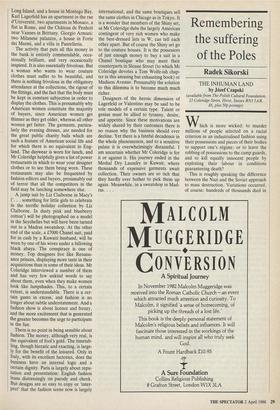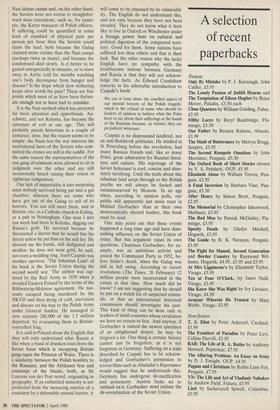Remembering the suffering of the Poles
Radek Sikorski
THE INHUMAN LAND by Jozef Czapski
(available from The Polish Cultural Foundation, 23 Coleridge Street, Hove, Sussex BN3 5A B, f6, plus 50p postage)
Which is more wicked: to murder millions of people selected on a racial criterion in an industrialised fashion using their possessions and pieces of their bodies to support one's regime; or to leave the robbing of possessions to the camp guards, and to kill equally innocent people by exploiting their labour in conditions guaranteeing death?
This is roughly speaking the difference between the Nazi and the Soviet approach to mass destruction. Variations occurred, of course: hundreds of thousands died in Nazi labour camps and, on the other hand, the Soviets were not averse to straightfor- ward mass executions, such as, for exam- ple, the Katyn massacre of Polish officers. If suffering could be quantified in some kind of standard of physical pain per person per hour then the Soviets could claim the lead, both because the Gulag claimed more victims than the Nazi camps (perhaps twice as many), and because the condemned died slowly. Is it better to be gassed unexpectedly in minutes, or to slave away in Arctic cold for months watching one's body decompose from hunger and disease? Is the hope which slow withering keeps alive worth the pain? These are fine points which most of us have been fortun- ate enough not to have had to consider.
It is the Nazi method which has attracted far more attention and opprobrium. Au- schwitz, and not Kolyma, has become the synonym of evil in our age. This will probably puzzle historians in a couple of centuries' time, but the reason seems to be simple: the Nazis lost the war whereas the institutional heirs of the Soviets who com- mitted the crimes are still in the saddle. For the same reason the representatives of the one gang of criminals were allowed to sit in judgment over the other and are still occasionally heard raising their voices in righteous indignation.
Our lack of impartiality is also surprising since nobody survived being put into a gas chamber, whereas there are some who have got out of the Gulag to tell of its horrors. You can still meet them, and in Britain, too, in a Catholic church in Ealing, or a pub in Nottingham. One man I met last week had been in Kolyma, digging out Russia's gold. He survived because he threatened a doctor that he would bite his throat unless he put him on the sick list. He showed me his hands, still disfigured and swollen: he does not wear gold, he said, not even a wedding ring. Jozef Czapski was another survivor. The Inhuman Land' of his book is the Soviet Union during the second world war. The author was cap- tured by the Red Army in 1939 when it invaded Eastern Poland by the terms of the Ribbentrop-Molotov agreement. He nar- rowly escaped being murdered by the NKVD and then dying of cold, starvation and disease on his way to the Polish Army under General Anders. He managed to save scarcely 200,000 of the 1.5 million deported, by evacuating them to British- controlled Iraq.
It is said in Poland about the English that they will only understand what Russia is like when a band of drunken louts from the Soviet force which is occupying Britain gang-rapes the Princess of Wales. There is a similarity between the Polish hostility to the Russians, and the Afrikaner fear and contempt of the blacks, both, as Sir Laurens van der Post noted, originating in geography. If an embattled minority is not protected from the menacing interior of a continent by a defensible natural barrier, it
will come to be obsessed by its vulnerabil- ity. The English do not understand this, and not only because they have not been invaded. They do not know what it feels like to live in Oxford or Winchester under a foreign power bent on cultural and political digestion of the conquered terri- tory. Good for them. Some nations have suffered less than others and that is their luck. But the other reason why the lucky English have no sympathy with the troublesome nations between Germany and Russia is that they will not acknow- ledge the facts. As Edward Crankshaw remarks in his admirable introduction to Czapski's book:
We can at least abate the cruellest aspect of our mental boycott of the Polish tragedy, which is the refusal of some who should be leaders of opinion to believe what the Poles have to say about their sufferings at the hands of the Russians because, as victims, they are prejudiced witnesses.
Czapski is no dispossesed landlord, nor an anti-Bolshevik politician. He studied in St Petersburg before the revolution, had many Russian friends and, like so many Poles, great admiration for Russian litera- ture and culture. His reportage of the Soviet holocaust is cool, concise and abso- lutely terrifying. Until the truth about this inhuman land seeps through to the British psyche we will always be fooled and outmanoeuvred by Moscow. In an age when, according to opinion polls, our public will apparently put more trust in Mikhail Gorbachev than in their own democratically elected leaders, this book must be read.
One may point out that these events happened a long time ago and have dimi- nishing influence on the Soviet Union of today. But this argument raises its own questions. Chairman Gorbachev, for ex- ample, was an ambitious activist and joined the Communist Party in 1952, be- fore Stalin's death, when the Gulag was still in full swing. According to recent revelations (The Times, 26 February) 12 million people were incarcerated in the camps at that time. How much did he know? I am not suggesting that he should be put on a watch list of suspected crimin- als, or that an international historical commission should investigate his past. This kind of thing can be done only to leaders of small countries whose retaliation we have no reason to fear. And anyway, if Gorbachev is indeed the newest specimen of an enlightened despot, he may be forgiven a lot. One thing is certain: history cannot just be forgotten, as it is not forgotten in Germany. Suffering on a scale described by Czapski has to be acknow- ledged and Gorbachev's permission to screen films such as Abuladze's Repentance would suggest that he understands this. Germany has undergone de-nazification and atonement, Austria looks set to embark on it. Gorbachev must initiate the de-sovietisation of the Soviet Union.



















































 Previous page
Previous page